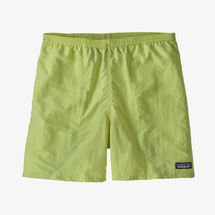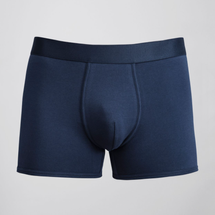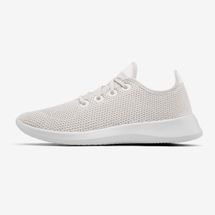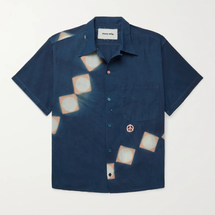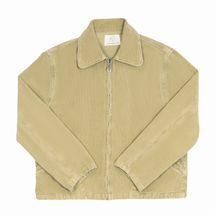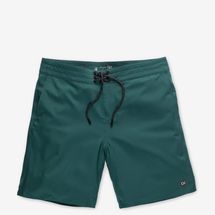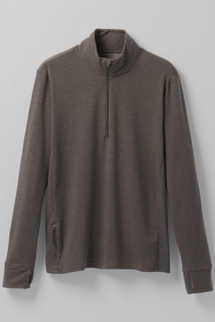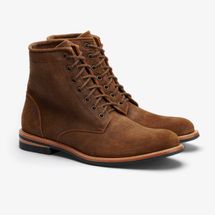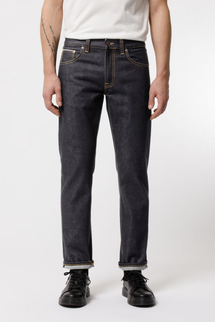
Since the mid 2000s, a distinct corner of the menswear world has lived by the motto “buy better, buy less.” This set of conscious shoppers has been reducing their carbon footprint by investing in well-made, durable clothing since way before sustainability became a buzzword. Now, interest in sustainable menswear has become more mainstream, expanding to include everything from post-consumer-waste swim trunks to sneakers made from eucalyptus trees. Most experts will tell you that to be truly sustainable you should wear and repair what you already own and only shop for “new” things secondhand. But you can still do some good by buying from sustainable clothing brands. The challenge is knowing which brands are actually sustainable and which are just using the term to jump on a trend.
The first step is to “ensure that the brand has clear, long-term sustainability commitments listed on their website,” says Kristy Drutman, host of the podcast Brown Girl Green. Look for brands that are committed to reducing waste, sourcing environmentally friendly materials, offsetting emissions, and paying their workers a living wage. Drutman gives extra points to brands that are BIPOC-owned and that give back to their local communities. If you’re unsure if what a brand says on their about page is credible, look for third-party certifications like bluesign, GOTS (Global Organic Textile Standard) certified organic, OEKO-TEX, fair trade, and B-Corp. There are also several nonprofit organizations that do in-depth research for you, rating brands on their environmental and social impact and publishing the findings online. “I always send people to Good on You and Remake’s Transparency Index. Both vet brands’ sustainability claims and score them, making more conscious shopping easy for consumers,” says Elizabeth L. Cline, journalist and author of The Conscious Closet.
Because the process of manufacturing a piece of clothing is so complex, it’s nearly impossible for most clothing brands to achieve true sustainability at every stage of the process. Instead, many choose one part of the supply chain to focus on first. This is also a helpful strategy for consumers who are looking for the best place to spend their money. Cayla O’Connell, CEO of the carbon-neutral underwear brand Knickey, which was featured in our article on sustainable women’s brands, says both brands and consumers can take the first steps to reducing their carbon footprint by prioritizing what matters to them most. “Figure out what your hot button issue is,” she says, and look for a company that supports it.
And remember, if a brand isn’t totally sustainable on every level, there are things you can do on your end to further reduce the impact on the environment. There are lots of resources, like Suay Sew Shop in Los Angeles, that can help you extend the life of your clothes with repairs and keep them out of landfills once they’re too old to wear. Taking good care of your clothes so you can wear them for a long time and finding a responsible way of recycling them once they are worn to pieces is an important part of being a conscious consumer, says Lindsay Medoff, Suay’s founder.
We spoke to Cline, Drutman, O’Connell, Medoff, and four other experts about the sustainable clothing brands for men they love, buy, and recommend. To help you navigate the list, we categorized brands by key areas of impact. When a company does a good job in more than one area, we’ve noted that, too.
If your main concern is responsibly sourced raw materials
“If you want to see what other brands are working towards, Patagonia is often the template,” says Cline. Founded by environmentalist and rock climber Yvon Chouinard in the early ’70s, Patagonia continues to be a pioneer in sustainable clothing production. “They were using more sustainable materials, like organic cotton, recycled synthetics, and non-toxic dyes, before most other brands,” she says. Some of the innovative materials they use include yulex (a naturally grown neoprene alternative), recycled fishing nets, recycled wool, fabric made from wood pulp and cotton scraps, and an indigo-dye alternative that uses less water and electricity in the dyeing process.
Patagonia was also recommended by Chris Curran of Homme Essentials in Richmond, Virginia, and Brad Bennett, a PR consultant for mission-driven apparel brands and the founder of the now-shuttered menswear blog Well Spent. But it’s not just sustainable materials that make them a leader in the industry. Cline points out that Patagonia also has its Worn Wear collection, an upcycled and pre-loved line. They teach you how to repair clothes or they’ll repair them for you. And they are aiming for carbon neutrality and investing in regenerative farming. “Beyond just their eco credentials of recycled and organic materials and their fair trade labor practices, the way they kind of emerged as a hardcore activist brand during the dark days with the Trump administration is pretty amazing,” says Bennett, who has used the brand’s repair program and loves his Patagonia baggies. “You can’t beat a pair of baggies. There’s really nothing else you need in the summer,” he says.
O’Connell recommends Swedish men’s basics brand Asket for their transparent supply chain and choice of raw materials. Strategist associate editor Louis Cheslaw is also a fan because they are realistic and open about their goals. Asket is working toward 100-percent traceability from farm to finished garment so that shoppers can see exactly where the organic cotton or linen was grown, processed, and sewn. They also provide what they call a “receipt” that shows you the impact of a garment, so you can see the amount of water consumption, CO2 emissions, and energy went into making the garment and how many wears you can expect to get from it. “They’re doing a really successful job in messaging, making it very digestible for people. Instead of broad sweeping statements about sustainability, they are actually showing you what that means,” she says.
Whether you’re a fan of their minimal sneakers or not, it’s hard to deny that All Birds is changing the way we view sneaker production. Both O’Connell and Drutman recommend the brand for its commitment to renewable resources through regenerative agriculture and their reduction of waste in packaging and throughout the production process. They use breathable merino wool ,which is renewable by nature: You can shear a sheep over and over again, and their grazing can help stimulate carbon-reducing plant growth. They also partner with farms that embrace biodiversity and long term land stewardship. In addition to wool, they use sustainable eucalyptus trees, recycled plastic bottles, recycled nylon, and sugarcane to make their shoes.
If your main concern is environmentally responsible production
Both Curran and Cheslaw speak highly of the London brand Story Mfg. Cheslaw loves that the brand puts emphasis on natural dyes, zero fabric waste, and a slow manufacturing process that allows almost all of their materials to be grown close to their studio in India. But that’s not all: “Their Positive Product Manifesto also speaks to the brand’s anti-racist work, refusal to use animal products, and focus on skin-friendly dyes. Oh, and the clothes are pretty sick too,” he says. Curran is a recent owner of their stuff and agrees that the brand is on point from both a fashion and a sustainability standpoint.
“I’m a huge fan of Older Brother,” says Curran, noting that he particularly likes the way the Los Angeles–based brand uses natural ingredients like chaga mushrooms and sea kelp to dye their clothes. They start with organic cotton, linen, wool, and rice paper sourced from farms in Japan and dye them without the use of toxic chemicals or heavy metals in their L.A. studio. Older Brother also uses renewable and biodegradable materials, like tree fill, a down alternative used to make their puffer coats.
If your main concern is reducing waste
Environmental educator Isaias Hernandez recommends Outerknown, one of his personal favorite brands, because they use renewable fibers to help fight against plastic pollution in the ocean, among other sustainable practices. Their swim trunks are made with 100-percent recycled polyester from post consumer waste like plastic bottles. Their products are made in fair-trade certified factories, and they are pursuing certification from the Fair Labor Association, which holds international brands to the highest standards. Shoppers can also check out the “Meet My Suppliers” section of Outerknown’s website to see where the company makes its clothes.
Prana is among a growing number of brands working toward circularity. According to Drutman, “A circular item of clothing is one that does not need to use raw, virgin materials to be produced. Instead it takes materials that have already been used and puts them back into production, ultimately keeping more waste from ending up in landfills.” The brand has started their own workshop dedicated to renewing pre-worn garments, saving them from becoming waste and giving them a new life. This project has allowed them to divert tens of thousands of textile waste from landfills since 2016. And when producing new items of clothing, Prana also prioritizes sustainable raw materials like organic cotton and hemp, fair-trade factories, and eliminating plastic from their packaging.
If your main concern is fair labor practices
Nashville-based leather shoe brand Nisolo is a certified B-Corporation, meaning they meet the highest standards of social and environmental responsibility, accountability, and transparency. Cline owns a pair of Nisolo women’s boots which she says “tick all the ethical fashion boxes for her.” Each pair of Nisolo shoes is made out of high-quality leather manufactured in factories that follow strict environmental guidelines. For each pair sold, a contribution is made to protect forests in the Amazon basin. She also says that Nisolo pays living wages, offers health-care benefits, and provides a healthy work environment to their factory workers in Peru. Plus, they offset 100 percent of their carbon emissions, a claim that is verified by Climate Neutral Certification.
Swedish denim brand Nudie Jeans comes recommended by Hernandez for their transparency and commitment to fair labor practices. They are members of the Fair Wear Foundation (FWF), a nonprofit organization that ensures all factories and suppliers used by a brand follow their code of labor practices. The FWF conducts regular audits of all Nudie Jeans partner facilities and has even helped train employees on more sustainable production practices. In addition to providing their workers with a living wage, Nudie Jeans uses sustainable materials like organic fair trade cotton, recycled cotton, recycled elastane, and in some cases recycled polyester. They also offer free repair services for life and will recycle your jeans when they are no longer wearable.
The Strategist is designed to surface the most useful, expert recommendations for things to buy across the vast e-commerce landscape. Some of our latest conquests include the best acne treatments, rolling luggage, pillows for side sleepers, natural anxiety remedies, and bath towels. We update links when possible, but note that deals can expire and all prices are subject to change.

